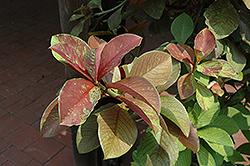It's all about ...
plants

African Milk Bush
Synadenium compactum var. rubrum
Height: 12 feet
Spread: 8 feet
Sunlight:
![]()
![]()
Hardiness Zone: 9a
Other Names: syn. Synadenium grantii Rubrum
Description:
A beautiful plant grown primarily for its stunning red and green foliage; frost tender, but leaves will re-emerge if there is no stem damage; tiny red flowers in summer and fall; will possibly grow quite large under ideal conditions; great for containers
Ornamental Features
African Milk Bush has attractive light green-variegated red foliage with hints of rose on a plant with an upright spreading habit of growth. The oval leaves are highly ornamental and remain red throughout the winter.
Landscape Attributes
African Milk Bush is a multi-stemmed evergreen shrub with an upright spreading habit of growth. Its relatively coarse texture can be used to stand it apart from other landscape plants with finer foliage.
This is a relatively low maintenance shrub, and is best pruned in late winter once the threat of extreme cold has passed. Deer don't particularly care for this plant and will usually leave it alone in favor of tastier treats. It has no significant negative characteristics.
African Milk Bush is recommended for the following landscape applications;
- Accent
- Mass Planting
- Hedges/Screening
- General Garden Use
- Container Planting
Planting & Growing
African Milk Bush will grow to be about 12 feet tall at maturity, with a spread of 8 feet. It has a low canopy, and is suitable for planting under power lines. It grows at a medium rate, and under ideal conditions can be expected to live for approximately 30 years.
This shrub does best in full sun to partial shade. It prefers dry to average moisture levels with very well-drained soil, and will often die in standing water. It is not particular as to soil type or pH. It is somewhat tolerant of urban pollution. This species is not originally from North America, and parts of it are known to be toxic to humans and animals, so care should be exercised in planting it around children and pets.
African Milk Bush makes a fine choice for the outdoor landscape, but it is also well-suited for use in outdoor pots and containers. Its large size and upright habit of growth lend it for use as a solitary accent, or in a composition surrounded by smaller plants around the base and those that spill over the edges. It is even sizeable enough that it can be grown alone in a suitable container. Note that when grown in a container, it may not perform exactly as indicated on the tag - this is to be expected. Also note that when growing plants in outdoor containers and baskets, they may require more frequent waterings than they would in the yard or garden. Be aware that in our climate, most plants cannot be expected to survive the winter if left in containers outdoors, and this plant is no exception. Contact our experts for more information on how to protect it over the winter months.
This plant is not reliably hardy in our region, and certain restrictions may apply; contact the store for more information.
